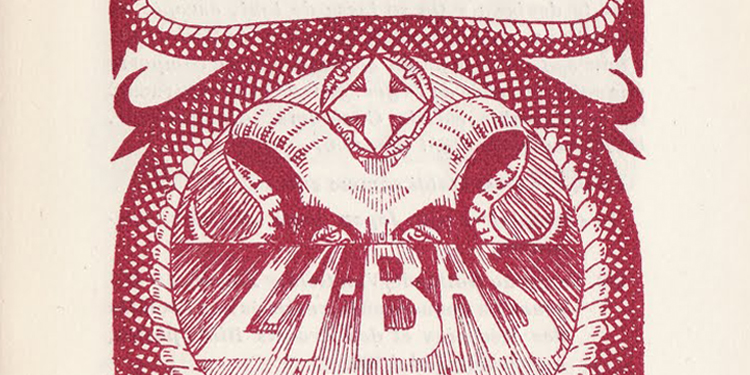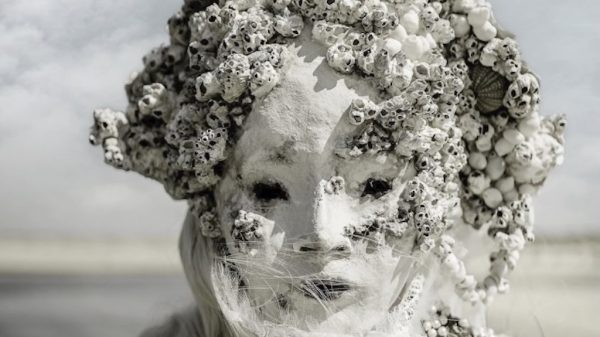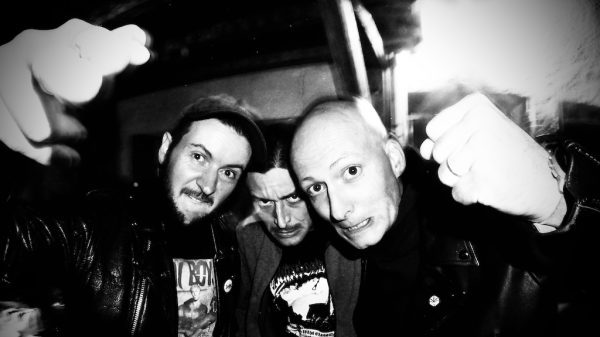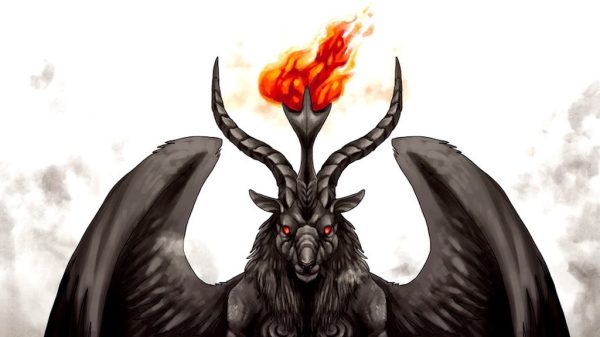They are Satanists. There is one of them who was a professor in the School of Medicine. In his home he has an oratorium where he prays to a statue of Venus Astarte mounted on an altar…
But what do they burn that smells like that?
Asphalt from the street, leaves of henbane, datura, dried nightshade, and myrrh. These are perfumes delightful to Satan, our master.
– LÀ-BAS, J.K. Huysmans 1891
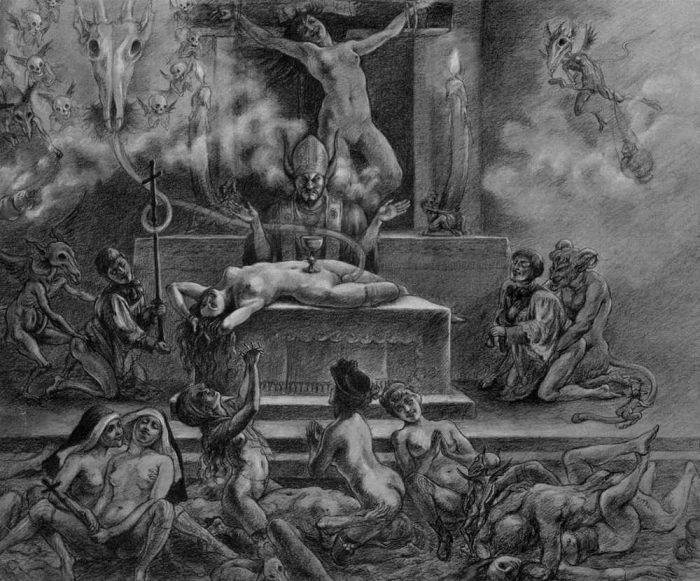
Before writer Henri Antoine Jules-Bois made his mark successfully predicting the rise of suburbia and the push for gender equality in a 1909 New York Times essay, he was a key figure in a war between French occultists that made headlines in Paris due to its lurid details of Satanism, human sacrifice and sex magic. Bois was not only a character in this highly publicized drama, but his own writing contributed to the furor of Satanism in France almost more than anyone else when he wrote Satanism and Magic in 1895, which proposed that Satanism was being practiced throughout France, and The Minor Religions of Paris in 1894, a work that documented the intermingling of neopagans, gnostics, Buddhists, occultists, and yes, Satanists, in the Parisian salons and secret societies.

Bois claimed there were two kinds of Satanists at work in France. The first kind was the solitary devil worshiper, who made deals with the Devil for personal gain; the second was more organized, gnostic in spirit, and Luciferian in nature, seeing the Devil as the liberator of humankind against the mendacious oppressor Yahweh. The second type was allegedly the kind that informed the inner secrets of occult societies, some of whom participated in the occult war that Bois found himself in. Bois had firsthand knowledge of these goings on, given that he was involved in occult practices at a rather high level. He was a close friend with McGregor Mathers, the founder of the Hermetic Order of the Golden Dawn, and was in some way tied to Abbé Joseph-Antoine Boullan, a former priest who himself was accused of being a Satanist. Boullan was the magician Bois aligned himself with during the occult war that would conclude with Bois challenging Boullan’s archenemy Stanislas de Guaita to ‘pistols at dawn.’

Described as a “Rosicrucian of the left-hand path,” Guaita was a wealthy Italian noble who lived in Paris and was one of Eliphas Levi’s disciples. Guaita was a central figure in the Parisian occult scene, known both for his knowledge as well as his extensive collection of occult books. He was so central that not only did fellow occultists seek him out for his knowledge, but a society of practitioners arose around him. He was also responsible for his own written contributions to the occult that included titles such as The Serpent of Genesis, The Temple of Satan and The Key of Black Magic – the latter of which includes an original rendering by Guaita later used by Anton LaVey as the “Sigil of Baphomet,” which itself is an illustration full of significance and symbolism for practitioners of the left-hand path.
In 1888, Guaita, along with Joséphin Péladan and Gérard Anaclet Vincent Encausse, better known as Papus (who himself was a founder and member of far too many occult societies to list here), founded the Kabbalistic Order of the Rosicrucians. The Order, which included such luminaries as Erik Satie and Claude Debussy among its members, believed that there were esoteric truths hidden in Christianity and other exoteric traditions that could be discovered through the use of Kabbalah, alchemy, astrology and other secret sciences.
In the meantime, Boullan had attempted to gain favor with Guaita. Boullan was a defrocked priest who had been accused of Satanism and spent three years in jail for fraud as a result of his activities as a healer alongside his accomplice Sister Adele Chevalier. Surrounding these charges were accusations that he and Chevalier had used spit, urine and feces in their practices, as well as engaged in black masses where Chevalier acted as the nude female altar. Even more damning was an accusation that Chevalier had birthed a child by Boullan and they had disposed of it in a Satanic sacrifice. These allegations eventually led to both of them being expelled from the Catholic Church.

During his time in jail, Boullan began to explore sex magic involving sexual union with higher and lower spirits. He claims to have even enjoyed sexual union with Jesus Christ. This practice would inform his later work, which emphasized universal love by way of a mixture of Christian mysticism, Kabbalah and sex magic. In some ways, his ideas appear as a precursor to New Age thought, particularly his belief in universal love practiced both spiritually and physically.

Receiving no acceptance from his former hosts in the Catholic Church, Boullan turned to Parisian occultists to help spread his ideas. He eventually met with Guiata in 1886. The meeting did not conclude with an agreement to work together, nor did it conclude with animosity. Yet, a year later, it appears that Guiata, along with his secretary Oswald Wirth, were behind the claim that indeed Boullan had fathered two babies with Chevalier and both had been sacrificed to Satan himself. Furthermore, Guiata and Writh exposed the sexual goings on, of which there were apparently plenty, in Boullan’s order. Guiata’s Temple of Satan included correspondences from Boullan detailing the sexual rites of his practice. It appears that what motivated Guiata’s attack on Boullan was what he saw as Boullan’s perversion of Kabbalah, saying that the true occultist could no longer tolerate Boullan’s mixing the purity of Kabbalah with the debased contents of his imagination.
It appeared that Boullan was finally ruined once and for all, but then along came the writer Joris-Karl Huysmans. Huysmans was working on a novel about Satanism in France with the intent to prove its existence beyond the mere allusions of romantic literature. Huysmans contacted Boullan to help him with his endeavor, to which Boullan replied that he had documents and proof of widespread Satanism throughout France, including the clergy and Rome itself. Of the many problems with Boullan’s claims is that not only was he the one accused of the very Satanic activity he said lurked around every corner, but that he seemed to indeed have an encyclopedic knowledge of the subject that eventually informed Huysmans’ book Là-Bas, the kind of which would only be known to a practitioner of the dark arts.

Nevertheless, once the two men began to collaborate they both became the subject of magical attack. They became convinced that Guiate and his associates were behind the attacks, and thus began the war of the black magicians of France. On one side of the divide stood Guaita, Papus, Péladan and Writh; on the other was Boullan, his currant acolyte Julie Thibault, Huysmans and, for reasons not entirely clear, Bois.

Huysmans wrote that Boullan and Thibault countered the attacks with their own magic, and that this war of attrition continued for some time, during which Péladan broke with Guaita and Papus, and Guaita developed a drug habit that would eventually kill him. In the end, though, Boullan and Thibault’s magic was not enough, and on January 4 of 1893 Boullan suffered a heart attack, believed to be the result of Guiate’s black magic. Yet, upon his death, it was Boullan who was once again accused of Satanism, being referred to in the press as “a clergyman who celebrated black masses.”
Huysmans sought to rehabilitate the image of Boullan in Là-Bas, making him into one of the few pure characters in a debased world, while making Guiate the basis for the diabolical Satanic priest of the book’s infamous black mass, which is quite vivid in detail. Bois went even farther and outright accused Guiate of murdering Boullan using black magic. Huysmans backed up Bois claim, saying, “it is indisputable that de Guiate and Peladan practice black magic daily…everything was done to kill my poor friend Boullan with a supreme curse.”
Bois, decidedly fed up with a purely magical war, challenged Guaita and Papus to duels. The first duel was between Bois and Guaita. Both men were said to employ magic to assist them, and both apparently succeeded, at least in the protective capacity as neither suffered injury, other than Bois’ horse who had an unexpected fit on the way to the duel. The second duel was between Bois and Papus using swords. Naturally, magic was employed this time as well, and Bois’ carriage crashed twice on the way to the duel. But again, both magicians’ efforts seemed to cancel each other out, as both were only slightly injured in the duel. Eventually, Papus and Bois would become friends, but Guiate would succumb to his drug addiction and die in 1897, leaving Papus in charge of the Kabbalistic Order of the Rosicrucians.

Yet that is not entirely the end of the story; there exists an intriguing epilogue to this magical war. It is claimed that late in his life, Huysmans, who had converted to Catholicism, told his confidants that indeed Boullan was a Satanist and that he defamed Guiate and his Rosicrucians by imputing upon them his own deeds. If true, this would explain the depth of Satanic knowledge he was able to impart to Huysmans, which informed Là-Bas with such authenticity. It would also explain more thoroughly the motivation behind this occult war. Boullan was clearly brought low by the exposure of his practices by Guiate, and Boullan, finding in Huysmans the perfect vessel by which to plot his revenge, revealed his own Satanic activity to the writer under the deception that it was Guiate, and not he, who practiced such blasphemies.
In reading Là-Bas one encounters passages promoting Satan as the hero of the oppressed and afflicted with a conviction that is hard to ignore:
And thou, thou whom, in my quality of priest, I force, whether thou wilt or no, to descend into this host, to incarnate thyself in this bread, Jesus, Artisan of Hoaxes, Bandit of Homage, Robber of Affection, hear! Since the day when thou didst issue from the complaisant bowels of a Virgin, thou hast failed all thine engagements, belied all thy promises. Centuries have wept, awaiting thee, fugitive God, mute God! Thou wast to redeem man and thou hast not, thou wast to appear in thy glory, and thou sleepest. Go, lie, say to the wretch who appeals to thee, ‘Hope, be patient, suffer; the hospital of souls will receive thee; the angels will assist thee; Heaven opens to thee.’ Impostor! thou knowest well that the angels, disgusted at thine inertness, abandon thee! Thou wast to be the Interpreter of our plaints, the Chamberlain of our tears; thou wast to convey them to the Father and thou hast not done so, for this intercession would disturb thine eternal sleep of happy satiety.
Thou hast forgotten the poverty thou didst preach, enamored vassal of Banks! Thou hast seen the weak crushed beneath the press of profit; thou hast heard the death rattle of the timid, paralyzed by famine, of women disemboweled for a bit of bread, and thou hast caused the Chancery of thy Simoniacs, thy commercial representatives, thy Popes, to answer by dilatory excuses and evasive promises, sacristy Shyster, huckster God!
Master, whose inconceivable ferocity engenders life and inflicts it on the innocent whom thou darest damn—in the name of what original sin?—whom thou darest punish—by the virtue of what covenants?—we would have thee confess thine impudent cheats, thine inexpiable crimes! We would drive deeper the nails into thy hands, press down the crown of thorns upon thy brow, bring blood and water from the dry wounds of thy sides.
And that we can and will do by violating the quietude of thy body, Profaner of ample vices, Abstractor of stupid purities, cursed Nazarene, do-nothing King, coward God!”
“Amen!” trilled the soprano voices of the choir boys.

Where these the words of Boullan? And if so, are they proof that he was indeed an authentic Satanist? Although the evidence that Boullan did court the Devil is more than a mere grain of salt, as with so much in French Satanism, it is hard to entirely know fact from fiction. As we will see in the final part of this series, Paris’ Satanic zeitgeist became the fodder for France’s greatest hoax in which fiction became fact, setting the stage for all future “satanic panics” to come.
